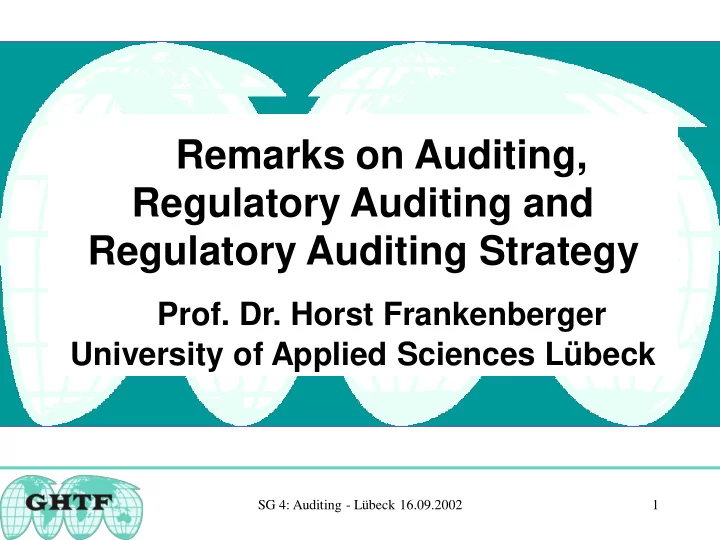

Remarks on Auditing, Regulatory Auditing and Regulatory Auditing Strategy Prof. Dr. Horst Frankenberger University of Applied Sciences Lübeck SG 4: Auditing - Lübeck 16.09.2002 1
Remarks on Auditing, Regulatory Auditing and Regulatory Auditing Strategy 1. Origin of terms - definitions of today 2. Objectives of an audit 3. Regulatory auditing strategy 4. Proposal to GHTF Steering Committee SG 4: Auditing - Lübeck 16.09.2002 2
1. Origin of terms - definitions Audit, auditing Origin audire (latin) to hear, to perceive (e.g. what is going on during an audit) to listen (e.g. to answers of questions of the auditor) Definitions Audit Systematic, independent and documented process for obtaining audit evidence and evaluating it objectively to determine the extent to which audit criteria are fulfilled (ISO 9000:2000) Audit A management tool for monitoring and verifying the effective implementation of an organization’s policy for quality ... (ISO/CD. 3 19011:2002) SG 4: Auditing - Lübeck 16.09.2002 3
1. Origin of terms - definitions Regulatory requirements Any part of a law, ordinance, decree or other regulation which applies to quality systems of medical device manufacturers (GHTF SG4 (99)28) Audit of the auditee’s quality system Regulatory audit to determine compliance with the relevant regulatory requirements (GHTF SG4 (99)28) SG 4: Auditing - Lübeck 16.09.2002 4
1. Origin of terms - definitions Process Origin procedere (latin) to proceed, to go on - a series of actions which produce a change or development Definitions Process Set of interrelated or interacting activities which transforms inputs into outputs (ISO 9000:2000) - Is the process identified and appropriately defined? - Are responsibilities assigned? - Are the procedures implemented and assigned? - Is the process effective in achieving the required results? SG 4: Auditing - Lübeck 16.09.2002 5
1. Origin of terms - definitions Strategy Origin strategos (greek) stratos army agos commander-in-chief 356 B.C. Aeneas manual for the „strategos“ Definitions Strategy is a general plan or set of plans to achieve something, especially over a long period (Collins Cobuild English Dictionary) Strategy is the logic that gives direction to the activities of the organisation. Strategy is articulated by top management in plans that are implemented at lower levels and updated over time (Barnett - Stanford University) SG 4: Auditing - Lübeck 16.09.2002 6
1. Origin of terms - definitions Regulatory auditing strategy, effectiveness of quality systems Definitions Regulatory auditing strategy is the process how to audit the effectiveness of quality systems including the fulfillment of regulatory requirements of medical device manufacturers Effectiveness of quality systems is given if the quality objectives are reached and the implemented quality system works as a control circuit according to the Deming PDCA-cycle (plan, do, check, act). Management is responsible for the effectiveness of a quality system SG 4: Auditing - Lübeck 16.09.2002 7
Deming - PDCA - Cycle DO PROCESS PARAMETER PLAN CHECK OBJECTIVES INPUT OUTPUT FULFILMENT PARAMETER PARAMETER ACT/CORRECT CONTROL PARAMETER SG 4: Auditing - Lübeck 16.09.2002 8
Process input: Objectives PLAN PDCA - cycle ACT DO CHECK Process output: Fulfilment SG 4: Auditing - Lübeck 16.09.2002 9
2. Objectives of a regulatory audit The regulatory audit must be conceived in such a way that • the effectiveness of the quality system including the fulfilment of regulatory requirements is measured in a systematic and independent manner within a reasonably short time • the audit is process-oriented and risk-based: focus on key areas of the manufacturer’s quality system • the audit is transparent to the auditee • the audit result is independent of the auditor - a necessity for harmonisation and mutual recognition of audit results SG 4: Auditing - Lübeck 16.09.2002 10
3. Regulatory auditing strategy (1) The auditing strategy is based on the audit objectives and consists of the following steps: • The quality system is subdivided in quality subsystems: “management controls”, “process management” and “CAPA” • The “process management” subsystem can be composed of further subsystems, e.g.: “design controls”, “production and process controls”, “material controls”, “records, documents, change controls” • The audit starts with an off-site preinspection of records from the manufacturer SG 4: Auditing - Lübeck 16.09.2002 11
3. Regulatory auditing strategy (2) The auditing strategy is based on the audit objectives and consists of the following steps: • The on- site audit starts with a review of the manufacturer’s “management controls”: review of top systemwide procedures and policies. For more information the auditor follows the “top down” approach • According to the PDCA-concept the auditor is not only looking for “plan” and “do” procedures in each subsystem but also for the “check” and “act” procedures - the “corrective and preventive actions :CAPA” SG 4: Auditing - Lübeck 16.09.2002 12
3. Regulatory auditing strategy (3) The auditing strategy is based on the audit objectives and consists of the following steps: • The PDCA-concept is not only applied in each subsystem but in the whole quality system • The use of sampling tables allow the auditor to document the non-existence or the existence of compliance problems through statistically valid sampling SG 4: Auditing - Lübeck 16.09.2002 13
Regulatory Audit of the Quality System Start - Management controls - Stop Process CAPA management PLAN ACT Records, Design controls DO documents, CHECK change controls Material controls Production and process controls SG 4: Auditing - Lübeck 16.09.2002 14
3. Regulatory auditing strategy (3) Conclusion Uniform approach which is independent of the • auditor • auditing organisation • regulatory system Benefits • Systematic and transparent audit process - both for the regulatory sides and the manufacturer • Reductions in audit time and audit costs SG 4: Auditing - Lübeck 16.09.2002 15
4. Proposal to GHTF Steering Committee The objectives oriented top-down approach following the PDCA - cycle should be used for auditing the GHTF work in the Study Groups and also in the Steering Committee SG 4: Auditing - Lübeck 16.09.2002 16
Recommend
More recommend